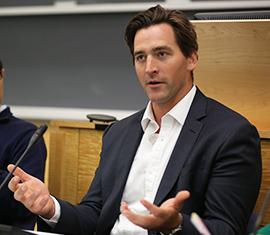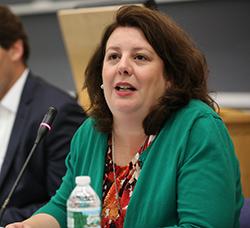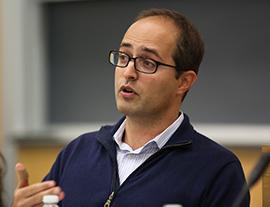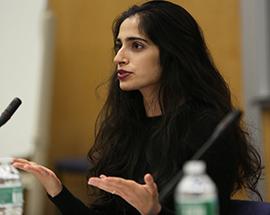Building a Career in Intellectual Property and Fashion Law
Recent alumni offer advice to current students on preparing for—and landing—a job in IP law and the fashion sector
New York, October 14, 2014—Columbia Law School alumnus Joshua Schiller ’08 can trace his interest in intellectual property law to his time as an undergraduate, in the early days of free music downloading. In 2000, under legal pressure, his university became one of the first to block students’ access to the popular online music-sharing service Napster.
| Joshua Schiller '08, a third-year associate at Boies, Schiller & Flexner |
“Napster led me to follow the law of copyright in The New York Times generally, and then to start to try to figure out what fair use was all about,” Schiller recalled at an October 1 panel featuring recent Columbia Law School graduates who work in IP and fashion law, sponsored by the Kernochan Center for Law, Media and the Arts.
The panel, moderated by the center’s Assistant Director Philippa Loengard ’03, included discussion by the alumni about their career paths, clinical and externship opportunities they had during their time at the Law School, and advice for current students.
| Philippa Loengard '03, assistant director of the Kernochan Center and a lecturer in law |
Now a third-year associate at Boies, Schiller & Flexner, Schiller counts IP among his main areas of practice. In 2012, he argued a fair-use case that was closely watched in both the art and legal worlds, involving the artist Richard Prince, who appropriates others’ images for his own art. Schiller successfully argued Prince’s case before the U.S. Court of Appeals for the Second Circuit, which decided that Prince’s work meets fair-use standards.
Schiller told the dozens of students in the audience that they should cultivate their interest in IP law no matter what area they practice in.
“If you go into a big firm with an interest in IP, don’t lose that interest whether you get to work on IP or not,” he said. “I hadn’t worked on any significant fair-use cases, let alone an IP case, up until that point. But I had told people about my interest, so when [the Prince appeal] came to the firm, people found it natural that I was very interested in bringing it and leading it.”
| Daniel Nemet-Nejat '10, an associate at Davis & Gilbert |
Daniel Nemet-Nejat ’10, an associate at Davis & Gilbert who served as articles editor on the Columbia Journal of Law & the Arts, echoed Schiller’s advice.
“People do appreciate you taking the initiative and they do remember that,” he said.
Nemet-Nejat detailed his own career path, which included working as a filmmaker (he holds an MFA in film from Columbia’s School of the Arts) and as a journalist for, among other places, Entertainment Weekly. At Davis & Gilbert, Nemet-Nejat typically juggles multiple projects, including talent and licensing agreements.
“Whereas, as a litigator you’ll work on one, maybe two matters over the course of several months, on a busy day I could work on 25, so it can be a little hyperkinetic,” he said. “But it’s also a lot of fun.”
| Aditi Venkatesh '11, corporate & commercial counsel at Ralph Lauren |
Aditi Venkatesh ’11, who works in-house at Ralph Lauren, described her career thus far as unpredictable. She took a job at Dewey & LeBoeuf, but after the firm filed for bankruptcy, an alumna at Ralph Lauren helped her land a job on the corporate team at the company.
Though Venkatesh had always planned to work in IP, she finds her job an unexpectedly perfect fit. She said courses at the Law School, along with an internship at Chanel, prepared her for position.
Nemet-Nejat agreed that experiential learning was key to his success. As a student, he took and served as a TA for the Mediation Clinic and negotiation seminar, and did an externship with Volunteer Lawyers for the Arts
"I draw on those experiences daily," he said.
"I draw on those experiences daily," he said.



